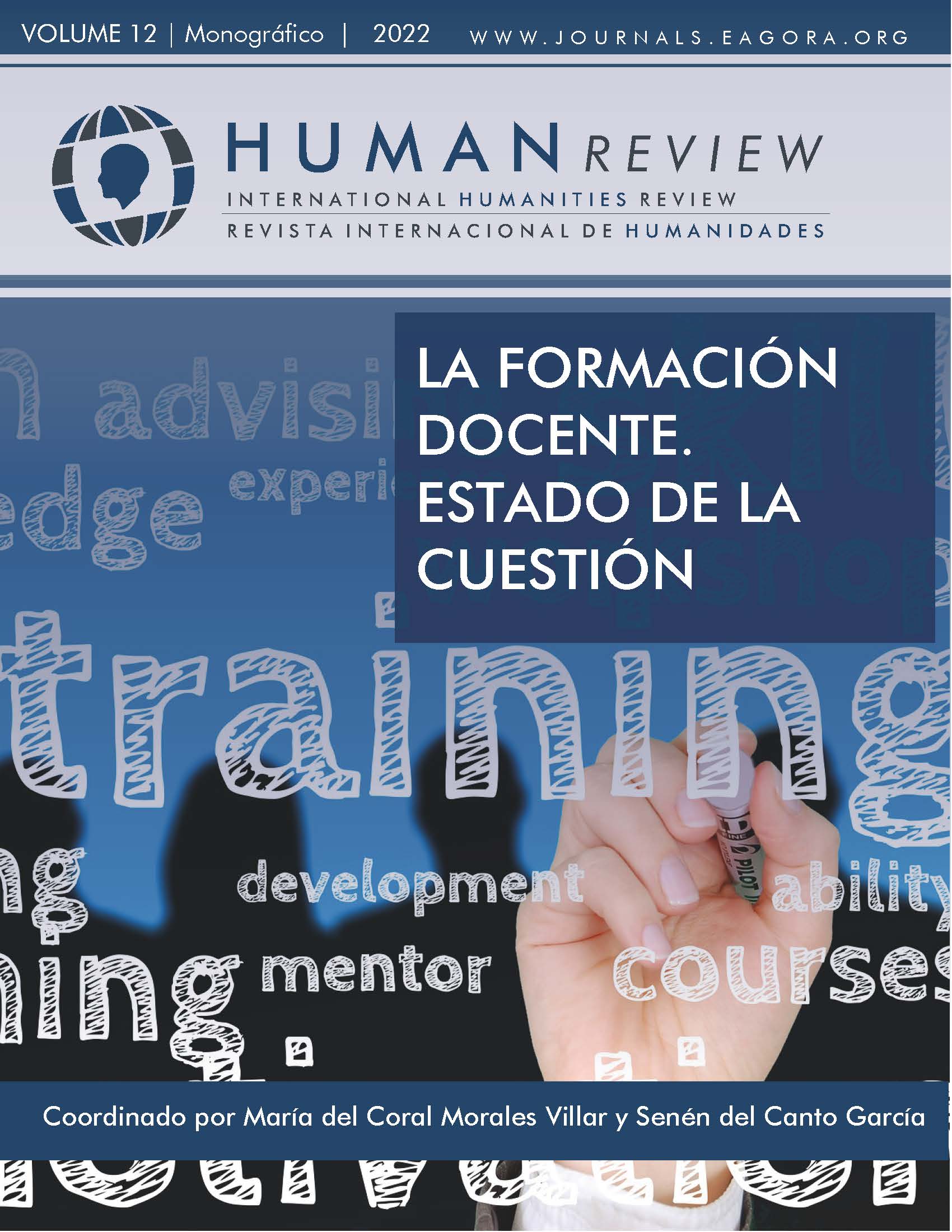Innovation through PBL in the subject of history of advertising
The podcast as a learning tool
DOI:
https://doi.org/10.37467/revhuman.v11.3914Keywords:
Podcast, Podcasting, Teaching Innovation, ABP, EEES, History of advertising, Advertising DegreeAbstract
This project collects the work process carried out by 107 students in the subject of History of Advertising taught in the first year of the degree in Advertising at the Francisco de Vitoria University.
This project has allowed the incorporation of Project-Based Learning as a teaching methodology and its application to the production of a podcast by students.
In this sense, we see that both the PBL and the podcast are presented as an alternative to traditional learning methods, thus favoring the acquisition of the skills that are required of the student within the European Higher Education Area (EHEA).
References
Araz, G. y Sungur, S. (2007) The interplay between cognitive and motivational variables in a problem-based learning environment. Learning and Individual Differences. 17, 291-297. DOI: https://doi.org/10.1016/j.lindif.2007.04.003
Ausín, V., Abella, V., Delgado, V., y Hortigüela, D. (2016). Aprendizaje basado en proyectos a través de las TIC: Una experiencia de innovación docente desde las aulas universitarias. Formación universitaria, 9 (3), 31-38. DOI: https://doi.org/10.4067/S0718-50062016000300005
Blumenfeld, P.C., Soloway, E., Marx, R.W., Krajcik, J.S., Guzdial, M. y Palincsar, A. (1991) Motivating projectbased learning: Sustaining the doing, supporting the learning. Educational Psychologist, 26 (3 y 4), 369-398. DOI: https://doi.org/10.1080/00461520.1991.9653139
Cárdenas Parra, C.M. y Ramírez Valencia, A. (2020). Uso de podcast en la enseñanza de la lengua inglesa. Revista boletín Redipe, 10 (2), 144-157 DOI: https://doi.org/10.36260/rbr.v10i2.1201
Cea, A. y de Vicente, A.M. (2020). El uso del podcasting en el aprendizaje: evaluación de usos y experiencias en la literatura académica. VII Jornadas Iberoamericanas de Innovación Educativa en el Ámbito de las TIC y las TAC. https://accedacris.ulpgc.es/bitstream/10553/76442/2/El_uso_del_podcasting.pdf
Downes, S. (2007). Learning Networks in Practice. En BECTA. Emerging Technologies for Learning. http://partners.becta.org.uk/page_documents/research/emerging_technologies07.pdf
Esteve, F. (2009). Bolonia y las TIC: de la docencia 1.0 al aprendizaje 2.0. La Cuestión Universitaria, 5, 58-67.
García Martín, J. y Pérez Martínez, J.E. (2018). Aprendizaje basado en proyectos: método para el diseño de actividades. CEF,10, 37-63 DOI: https://doi.org/10.51302/tce.2018.194
García-Hernández C., Ruiz-Fernández J., Herrán-AlonsoM. y Gallinar-CañedoD. (2022). Podcast para el aprendizaje y la difusión de los Fundamentos de la Geografía. Cuadernos Geográficos, 61(1), 168-188. https://doi.org/10.30827/cuadgeo.v61i1.18491 DOI: https://doi.org/10.30827/cuadgeo.v61i1.18491
García-Peinazo, D. (2019). A la parrilla suena mejor: El podcast como estrategia didáctica basada en el ABP para el análisis y la gestión de eventos en la asignatura Historia de la Música. Tercio Creciente, 15, 73-84. https://dx.doi.org/10.17561/rtc.n15.5 DOI: https://doi.org/10.17561/rtc.n15.5
Kolmos, A., Hadgraft, R. G. y Holgaard, J. E. (2015). Response strategies for curriculum change in engineering. International Journal of Technology and De-sign Education, 25(4), 1-21.
Maag, M. (2007). iPod, uPod? An emerging mobile learning tool in nursing education and students’ satisfaction.https://portal.uah.es/portal/page/portal/epd2_profesores/prof23288/publicaciones/deMarcos2011_CIN_Final_Using_M_Learning_on_Nursing_Courses_to_Improve.8.pdf
Maldonado Pérez, M. (2008). Aprendizaje basado en proyectos colaborativos. Una experiencia en educación superior. Laurus, 14 (28),158-180 https://www.redalyc.org/articulo.oa?id=76111716009
Marti, J.A., Heydrich, M., Rojas, M. y Hernández, A. (2010). Aprendizaje basado en proyectos. Una experiencia de innovación docente. Revista Universidad EAFIT. 46, (158), 11-21.
Mettas, AC. y Constantinou, CC. (2017) The technology fair: a project-based learning approach for enhancing problem solving skills and interest in design and technology education. International Journal of Technology and Design Education, 18, 79-100. DOI: https://doi.org/10.1007/s10798-006-9011-3
Moliner, O. y Sánchez-Tarazaga, L. (2015). PBL o aprendizaje basado en proyectos: una experiencia de coordinación y enseñanza auténtica en la universidad. Quaderns Digitals, 81, 116-133.
Moura, A. y Carvalho, A. (2006). Podcast: potencialidades na educação. Prisma, (3), 88-110. https://ojs.letras.up.pt/index.php/prismacom/article/view/2112
Núñez del Río, M. C. y Fontana Abad, M. (2014). Competencia socioemocional en el aula: Características del profesor que favorecen la motivación por el aprendizaje en alumnos de Enseñanza Secundaria Obligatoria. REOP -Revista Española De Orientación Y Psicopedagogía, 20(3) 257–269. https://doi.org/10.5944/reop.vol.20.num.3.2009.11501 DOI: https://doi.org/10.5944/reop.vol.20.num.3.2009.11501
Olmedo Salar, S., López Villafranca, P. y Muñoz Cámara, E. (2022). Radiografía del universo sonoro en los estudios de comunicación en España: la aplicación del pódcast en el aula. Revista Latina de Comunicación Social, 80, 21-39. https://www.doi.org/10.4185/RLCS-2022-1770 DOI: https://doi.org/10.4185/RLCS-2022-1770
Piñeiro Otero, T. (2011). La utilización de los podcast en la Universidad Española: entre la institución y la enseñanza hologramatica. UNLZ ,15, (4), 27-49
Rodríguez-Sandoval, Eduardo, Vargas-Solano, Édgar Mauricio, y Luna-Cortés, Janeth. (2010). Evaluación de la estrategia „aprendizaje basado en proyectos“. Educación y Educadores , 13 (1), 13-25. http://www.scielo.org.co/scielo.php?script=sci_arttextypid=S0123-12942010000100002ylng=enytlng=es. DOI: https://doi.org/10.5294/edu.2010.13.1.1
Sánchez Vera, M. y Solano Fernández, I. M. (2013). El uso de recursos multimedia para la renovación metodológica: una experiencia en futuros maestros de Educación Infantil. EDUTEC 2013. Conferencia llevada a cabo en el XVI Congreso EDUTEC 2013, Costa Rica.
Sánchez Vera, M. y Solano Fernández, I.M. (2010). Aprendiendo en cualquier lugar: el podcast educativo. Pixel-Bit. Revista de Medios y Educación, (36),125-139. https://www.redalyc.org/articulo.oa?id=36815128010
Santos, J., Galán, J.M., Izquierdo, L. y del Olmo, R. (2009). Aplicaciones de las TIC en el nuevo modelo de enseñanza del EEES. XIII Congreso de Ingeniería de Organización. Dirección y Organización, 39, 5-11. doi.org/10.37610/dyo.v0i39.22 DOI: https://doi.org/10.37610/dyo.v0i39.22
Solano Fernández, I.M. y Amat Muñoz, L. (2008). Digitum, biblioteca universitaria. Universidad de Murcia. Editorial EDUTEC. http://hdl.handle.net/10201/14623
Watson G. (2002). Using technology to promote success in PBL courses. The technology source. University of Noth Carolina,: http://technologysource.org/article/using_technology_to_promote_success_in_pbl_courses/.
Yip W. (2002). Students‘ Perceptions of the Technological Supports for Problem-based Learning. Educ. Inf. Technol, 7, 303-312. DOI: https://doi.org/10.1007/978-0-387-35596-2_16
Downloads
Published
How to Cite
Issue
Section
License
Those authors who publish in this journal accept the following terms:
- Authors will keep the moral right of the work and they will transfer the commercial rights.
- After 1 year from publication, the work shall thereafter be open access online on our website, but will retain copyright.
- In the event that the authors wish to assign an Creative Commons (CC) license, they may request it by writing to publishing@eagora.org









